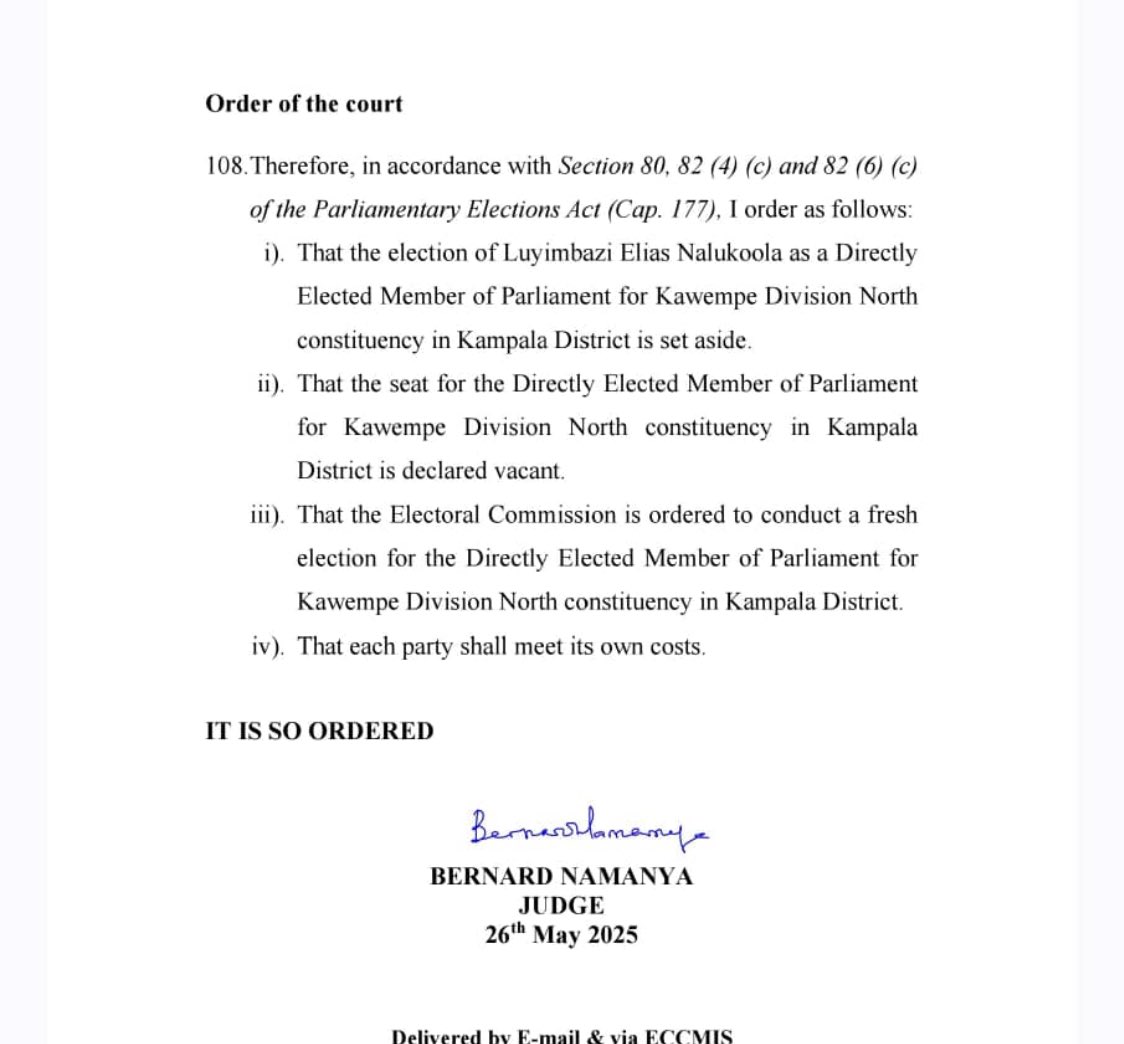In a decision that has captured the nation’s attention, Uganda’s judiciary has once again asserted its independence by overturning the election of Elias Luyimbazi Nalukoola as Member of Parliament for Kawempe North. The ruling, which declared the seat vacant, was issued after a thorough examination of allegations that the electoral process had been compromised by serious irregularities and violations of democratic principles. This landmark judgment is not merely about one constituency or one candidate; it is a testament to the resilience of Uganda’s legal system and a reminder of the ongoing struggle to uphold the rule of law in a politically charged environment.
The Background: A Hotly Contested By-Election
Kawempe North, a vibrant and densely populated constituency in Kampala, has long been a microcosm of Uganda’s political dynamics. The recent by-election, held in early 2025, was marked by intense campaigning, heightened emotions, and a palpable sense of anticipation. The contest primarily pitted Elias Luyimbazi Nalukoola of the National Unity Platform (NUP) against Faridah Nambi Kigongo of the National Resistance Movement (NRM). From the outset, the race was fraught with allegations of foul play, with both sides accusing the other of undermining the integrity of the electoral process.

The Legal Challenge: Allegations and Evidence
The petition to nullify Nalukoola’s victory was filed by Faridah Nambi Kigongo, who argued that the election had been marred by significant irregularities. Key among her claims was that thousands of voters had been denied the opportunity to cast their ballots, particularly at polling stations where results were either not returned or were disputed. She also alleged that Nalukoola had engaged in illegal campaigning on election day, a serious violation of Uganda’s electoral laws.
The High Court, presided over by Justice Bernard Namanya, meticulously reviewed the evidence presented. Witness testimonies, affidavits, and documentary evidence painted a picture of a process that had fallen short of the standards required for a free and fair election. The court found that the disenfranchisement of voters was not only widespread but also had a material impact on the outcome of the election. Furthermore, the evidence of illegal campaigning on election day was deemed sufficient to warrant the nullification of the results.
The Ruling: A Victory for Electoral Integrity
In its ruling, the court declared the Kawempe North parliamentary seat vacant, effectively canceling Nalukoola’s election. The decision was celebrated by supporters of the NRM and those who had long advocated for greater accountability in Uganda’s electoral processes. However, it also sparked debate about the broader implications for the country’s democracy.
The court’s refusal to declare Nambi the winner, instead opting to order a fresh election, was seen by many as a prudent move. It underscored the judiciary’s commitment to fairness and its reluctance to impose a victor in the absence of a clear mandate. This approach has been praised by legal experts and civil society organizations, who view it as a step toward strengthening public confidence in the electoral system.
The Aftermath: Political and Social Repercussions
The nullification of Nalukoola’s election has sent ripples through Uganda’s political landscape. For the residents of Kawempe North, it means a return to the campaign trail and another opportunity to choose their representative. For the political parties involved, it is a chance to reflect on their strategies and the importance of adhering to the rules of the game.
The ruling also serves as a cautionary tale for candidates and electoral officials alike. It highlights the consequences of flouting electoral laws and the critical role of the judiciary in safeguarding democracy. In a country where electoral disputes are often settled in the court of public opinion or through political machinations, this judgment stands out as a rare instance of legal accountability.
The Bigger Picture: Lessons for Uganda’s Democracy
The Kawempe North case is more than just a local dispute; it is a microcosm of the challenges facing Uganda’s democracy. The ruling demonstrates that the judiciary is willing and able to hold those in power accountable, even in the face of intense political pressure. It also underscores the importance of robust legal frameworks and independent institutions in ensuring the integrity of the electoral process.
As Uganda prepares for future elections, the lessons from Kawempe North will be invaluable. The case serves as a reminder that democracy is not just about winning at all costs, but about respecting the rules, protecting the rights of voters, and upholding the principles of fairness and transparency.
Conclusion A Step Forward for Justice
The cancellation of Nalukoola’s election as Kawempe North MP is a significant milestone in Uganda’s democratic journey. It reaffirms the judiciary’s role as a guardian of the constitution and a bulwark against electoral malpractice. While the road ahead may be uncertain, the ruling offers hope that, with continued vigilance and commitment to the rule of law, Uganda’s democracy can grow stronger and more resilient.
By prioritizing integrity over expediency, the court has set a powerful precedent. It is now up to all stakeholders—political parties, electoral officials, civil society, and the electorate—to build on this foundation and ensure that the will of the people is truly reflected in every election.

